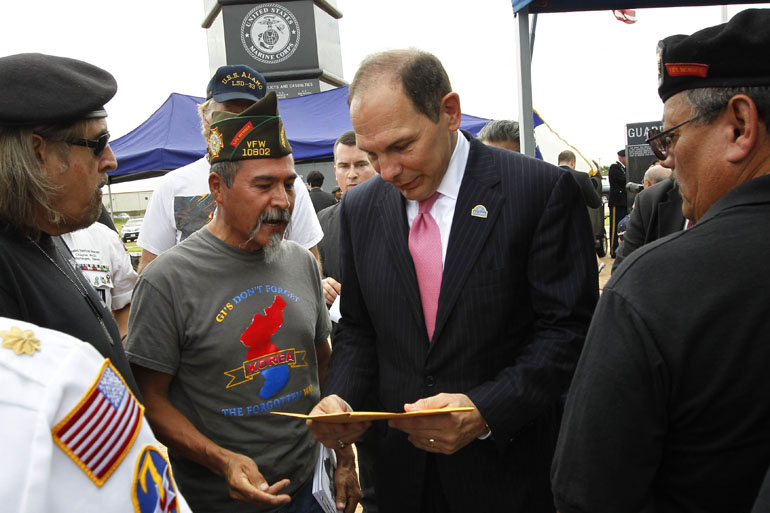Veterans Day is when America stops to thank those who have sacrificed to keep the country safe and free. This year, gratitude for their service includes a significant step to help keep them healthier.
Most former servicemen and women (and their families) get their health care at civilian facilities, where only rarely do health professionals ask patients if they or close relatives have a military background. But not only do veterans suffer from a disproportionate share of ailments like post-traumatic stress disorder and brain injury, many who were in combat zones may also have been exposed to hazards such as the defoliant Agent Orange in Vietnam, or huge burn pits in Iraq and Afghanistan that produced toxic fumes.
Recognizing the potential for missing important health issues, a small group of medical professionals banded together to ensure that in the future doctors will at least be aware of the possible medical problems of former military members, who now number about 14 million. Going forward, the exam every medical student and new physician must take to get a license will include questions about military medicine. That, in turn will force medical schools to teach it.
Brian Baird, a former Democratic member of Congress from Washington and a licensed clinical psychologist, has helped spearhead the change, which is being publicized as the country prepares for Veterans Day this Wednesday. He said he was inspired by some of his own patients who returned from duty in need of help.
“We don’t even ask, ‘Have you or a loved one been deployed overseas,’” he said in an interview. “And I thought, what a terrible oversight.”
Baird set out to talk to every medical organization he could find. Several responded, or were working on a similar project at the same time, including the White House’s “Joining Forces” initiative.
Baird found an eager partner in Steven Haist, a physician and vice president at the National Board of Medical Examiners, which develops and runs the U.S. Medical Licensing Exam.
Haist has spent nearly four years organizing the effort and bringing in specialists from the Department of Veterans Affairs and every branch of the military to develop and write the questions. Military medicine will be included in all three of the exam’s “steps,” which students take at different points in medical school and after they complete the early phases of post-graduate training.
“In some respects, I think it could have been done a lot sooner,” said Haist, given many of the well-recognized issues affecting returning troops from Vietnam and the first Gulf War. But he said he hopes that ensuring that physicians know about potential problems “will improve the health care that is received by returning deployed servicemen and women and their families.”
Dr. Karen Sanders, who helps oversee academic training for the VA, and who got the project funded, says she’s confident the change will make things happen. “If you change the exams, schools and curricula will follow,” she said. “We hope this will drive schools to offer courses” in medical conditions experienced by members of the military. A survey conducted by the Association of American Medical Colleges found that as of 2012, only about half the schools had such courses.
Other medical organizations have also acted to better integrate the health problems stemming from military duty into non-military health care. Both the American Medical Association and American Academy of Nursing are actively encouraging providers to ask patients about their or a family member’s military service.
But encouraging is not enough, say Howard and Jean Somers. Their son, Daniel, committed suicide in 2013 after being unable to receive treatment for mental health issues upon returning from Iraq. They have been working to improve the care at the VA and bring more attention to returning troops’ health problems ever since.
“How do you make it a requirement without making it part of the licensing or re-licensing,” said Howard Somers, a retired urologist.
They called putting questions on the licensing exam “fantastic,” but stressed that something similar needs to be done to educate doctors who have completed their training and initial licensing.
In order to maintain his medical license, said Howard Somers, “I had to take an online course in pain management. That would be another way to address this, to get medical societies to make this a requirement.”
Former Rep. Baird agrees. “I’ve asked a lot of physicians about it, and many of them said, ‘You know I’ve had courses in things I will never see in my practice. But there’s a pretty darn good chance I’m going to see somebody who’s been deployed.’”
But getting military service training to be a required part of continuing education for doctors is a daunting task. “You’d have to deal (separately) with every state medical board,” says the VA’s Sanders.
There is also a parallel effort to put questions about military service not just on intake forms that patients fill out but also in the electronic medical records that are filled in by health care providers.
Erika Koch, a spokeswoman for Epic, the dominant software developer in the market, said that the company’s standard record does include questions about military service, but they don’t show up unless the customer — a hospital or doctor’s office – requests that. “Pediatrics, for example, will not turn it on,” she said.
But Baird insists that the question should be included on every single electronic medical record, including those for children: “The classic case would be a child struggling in school, who can’t sleep.” A doctor might prescribe medication, he said, “but never stops to ask if anybody in the (child’s) family has been deployed.”
Baird recognizes that while the adoption of the test questions marks a milestone, there is still a long way to go. “My goal is nothing less than making this a permanent aspect of our medical education and our health care system,” he said. “It’s rather shocking that it hasn’t been done actually.”








